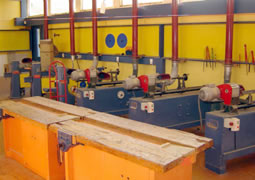Abstract
Reference: CP909
Title: Integrated Workshops: Designing environments that foster imagination and spark a creative fire
The classic wood and metal workshops have served well, catering for the acquisition of practical skills in a methodical and predictable manner; however, times change. These environments were designed for the needs and processes of more than half a century ago and the subjects they were designed to facilitate and enable have since undergone a huge metamorphosis.
And so Technology HoDs throughout New Zealand are left to ponder some key and very practical questions:
- how much should schools adapt the subject of Technology to accommodate the limitations of legacy environments?
- how can schools effectively adapt these environments to accommodate this new subject and its specific needs and teaching and learning approaches, particularly when being assessed under the Achievement Standards?
- how can these adaptations be made in a practical and cost-effective way, that will key-in to possible future rebuilds of the Technology teaching environments?
- when is adaption not enough, and new purpose-built areas become essential?
This case study examines how Matthew Lane led the change of the 40-year-old workshop environments of the Wellington College Technology department during 2003-2008, through a set of staged adaptions that culminated in the completion of the first stage towards a fully redeveloped Technology block.


